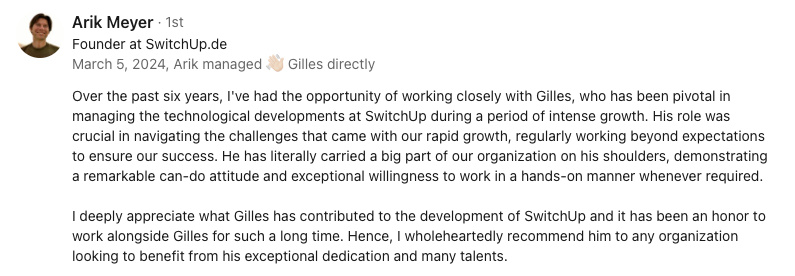Chief Technical Officer Salary Career Development
Abstract:
The role of a Chief Technical Officer (CTO) is crucial in driving technological innovation and aligning technical resources with business goals. Most CTOs have a background in technology and leadership, often starting as software developers or IT professionals and advancing through roles like technical lead or VP of engineering. CTOs need strong communication, strategic thinking, and decision-making skills, along with staying updated on technological trends. In the United States, CTO salaries range from $150,000 to $300,000 per year, with additional bonuses and stock options. Additionally, as CTOs advance in their careers, their earning potential can significantly increase. Becoming a successful CTO requires continuous learning and development, and the role will remain essential for business success as technology continues to be a core driver.
understanding the cto role
Have you ever pondered on the driving force behind a company's technological innovation? That's where the Chief Technology Officer (CTO) comes into play. Wearing numerous hats, the CTO is responsible for aligning a firm’s tech strategies with its business goals, ensuring that every digital advancement not only looks shiny but also propels the company forward. It's like being the owner of a magic wand but with a dash of reality and plenty of coding knowledge!
In this article, we'll explore the essential career development path for a CTO, the distinct skills and qualifications that make a standout candidate, and dive deep into the salary and compensation one can expect. Spoiler alert: It's quite impressive. And because technology never stands still, we’ll touch on the importance of continuous learning and what the future holds for those willing to grasp it. Buckle up; it's going to be an enlightening journey through the CTO profession!
career development path
Now, let's get into the nitty-gritty of climbing the career ladder to reach the esteemed position of CTO. It often starts at a rather humble beginning—think software developer or IT professional. These early roles are where the foundational skills are honed, and understanding the depths of coding, system administration, or IT support is crucial. Trust me, you don't get to wave that 'magic wand' without knowing what every spell (or line of code) does.
Advancing from these entry-level roles, the next rung might be a technical lead or a project manager. Here, you'll start to flex your leadership muscles. It's like upgrading from a foot soldier to a field marshal—you’re still heavily involved in the action but are now orchestrating tactics and guiding the troops. Being a technical lead often involves supervising smaller teams, managing timelines, and ensuring the project's technical aspects are on point. Leadership skills become paramount at this stage, not just technical prowess.
Then, you might progress to senior leadership positions like the VP of engineering or the Head of IT. This is where strategic thinking, business acumen, and broader project management skills are indispensable. In these roles, you're translating business objectives into technical strategies and ensuring they align perfectly. You're also likely to be deeply involved in budget decisions, vendor negotiations, and perhaps even some firefighting when a major project hits a snag. It’s a balancing act, but one where your technical and leadership skills harmonize.
A CTO role requires more than just being an uber-geek with a penchant for the latest gadgets. Sure, that's part of it, but the job is multifaceted. Experience in cross-functional roles, understanding the business side, and having a knack for visionary thinking are all crucial. Think of it as being the bridge between the tech wizards and the business moguls—communicating in both 'languages' fluently and effectively.
So, you see, the career path to becoming a CTO is a blend of acquiring robust technical expertise and evolving into a strategic leader. It’s a mission filled with continuous learning, adaptability, and the guts to lead and innovate. And yes, it’s an exciting journey—strap in for a ride that's equal parts challenge and reward!
skills and qualifications needed
Becoming a successful CTO is akin to mastering multiple disciplines. It’s like being a Swiss Army knife with a suit—versatile and sharp in every situation. Let’s break down the essential skills and qualifications that will help you shine in this pivotal role.
technical expertise
First and foremost, you need ironclad technical skills. Think of it as the bread and butter of the CTO role, without which you’d be like a fish out of water. Expertise in software development, cloud technologies, cybersecurity, and enterprise architecture forms the cornerstone of your technical foundation. Keep these skills polished and stay updated with the latest technological trends—because in tech, being a dinosaur isn’t cool.
effective communication
If you thought you could hide behind a screen forever, think again. Strong communication skills are non-negotiable. You’ll need to articulate complex tech concepts to non-tech stakeholders clearly and convincingly. Whether it's rallying your team, presenting to the board, or negotiating with vendors, being a tech translator who can switch seamlessly between 'geek speak' and business jargon is golden.
strategic thinking
The more you ascend the career ladder, the less you’ll find yourself in the coding trenches and more in the strategy war room. Being able to think strategically and align tech initiatives with business goals is crucial. This involves understanding market trends, competitive landscapes, and leveraging technology to carve out a competitive edge. It's like playing 4D chess with a circuit board.
decision-making abilities
With great power comes great responsibility—and many, many decisions. You’ve got to be decisive, but not reckless. Weigh the pros and cons, consider the risks, and sometimes, yes, go with your gut. Being able to make swift, informed decisions can mean the difference between leading your company to triumph or facing a tech catastrophe.
continuous learning
Never rest on your laurels. Technology evolves at the speed of light, and standing still isn’t an option. Continuous learning is part of the gig. Whether it’s through online courses, certifications, attending tech conferences, or casual lunch-and-learns with your team, keep your skills and knowledge as up-to-date as the latest smartphone model.
practical tips for aspiring ctOs
- Network: Connect with other CTOs and industry leaders to share insights and experiences.
- Mentorship: Seek a mentor who’s been there, done that, and got the CTO badge to prove it.
- Hands-On Practice: Don’t just learn; build. Side projects can be great proving grounds for new technologies.
- Read Voraciously: Keep abreast of industry publications, whitepapers, and tech blogs.
- Soft Skills Training: Invest time in developing leadership, conflict resolution, and team management skills.
Being a CTO isn’t just about having a knack for gadgets or being a code wizard. It’s a blend of technical prowess, strong communication, strategic foresight, and relentless learning. So, if you’re up for the challenge, grab your metaphorical magic wand and get ready to conjure a future of innovation and success!
cto salary and compensation
Let's talk numbers, shall we? If you're eyeing the Chief Technology Officer role, prepare to be dazzled by some impressive salary figures. In the United States, the base salary for a CTO can range anywhere from $150,000 to $250,000 per year. That's before we get into the juicy stuff—bonuses and stock options, which can significantly boost your total earnings.
breaking down the compensation package
Apart from the base salary, many CTOs enjoy performance-based bonuses, often tied to the company's success metrics. These bonuses can add tens of thousands to your annual income. Then, there are stock options. Companies, especially startups, offer equity stakes as part of the compensation package. If the company hits a home run, those stock options can turn into a goldmine.
factors influencing the salary
The size of the paycheck can vary depending on several factors:
- **Company Size:** Larger companies often have deeper pockets, translating to higher salaries.
- **Location:** CTOs in tech hubs like Silicon Valley or New York typically earn more than their counterparts in smaller cities.
- **Industry:** Companies in high-demand fields like artificial intelligence, cybersecurity, or fintech tend to offer higher compensation packages.
salary growth potential
The earning potential doesn’t stop there. As CTOs gain more experience and prove their worth, they often see significant salary growth. Some top-tier CTOs at major corporations can earn upwards of $500,000 annually, excluding stock options and bonuses. The added perks, such as executive benefits and travel allowances, make this role even more lucrative.
So, if you’re willing to put in the work and keep honing those skills, the financial rewards can be as impressive as the title itself. After all, steering a company's tech ship is no small feat and deserves every penny of the generous compensation it commands.
the importance of continuous learning and future prospects
It's safe to say, the job of a CTO is never boring! But to stay at the top of the game, embracing continuous learning is non-negotiable. Imagine trying to steer a ship with outdated maps—hilarity and disaster ensue. Keeping your skills sharp and your knowledge fresh ensures you can navigate the perilous waters of technological change adeptly.
commitment to lifelong learning
In our fast-paced industry, staying static is the fastest way to obsolescence. To truly thrive, you've got to be a lifelong student. Engage in regular professional development activities, whether that’s enrolling in advanced tech courses, attending industry conferences, or even diving into a heap of books and whitepapers after hours. The breadth of knowledge you amass will serve as your arsenal in tackling complex technological challenges effectively.
embracing technological advancements
Artificial intelligence, blockchain, quantum computing—the buzzwords are endless and the innovations, even more so. As tech leaders, embracing these advancements not only keeps you relevant but positions you as a pioneer within your organization. Think of it as a way to future-proof your career while simultaneously driving business forward.
networking and mentorship
Never underestimate the power of a strong professional network. Engaging with other tech leaders allows for the exchange of knowledge and best practices, and mentoring can provide you with insights you might not have considered. Plus, there's something to be said for the camaraderie and support found in these professional relationships.
the bigger picture
Think of your continuous learning journey as an investment in the company's future as well as your own. By staying ahead of technological trends and industry shifts, you can make more informed, strategic decisions. Your value doesn't just come from what you know, but how you use that knowledge to drive innovation and growth.
In short, a successful CTO isn’t just a tech wizard, but a perpetual learner, an advocate for innovation, and a strategic thinker. So, keep feeding that curiosity, stay connected, and remember to enjoy the ride—because being a CTO is one wild and rewarding adventure!














